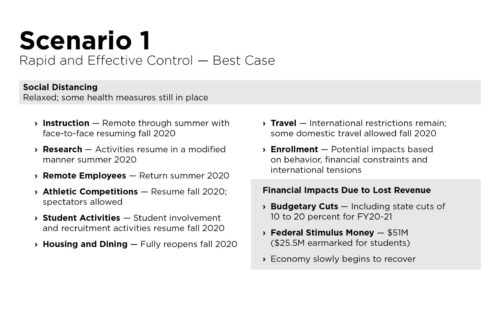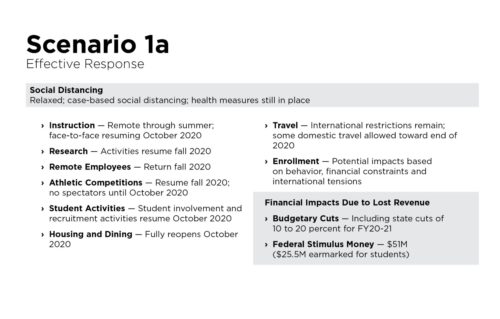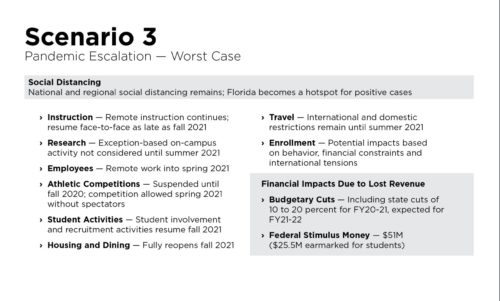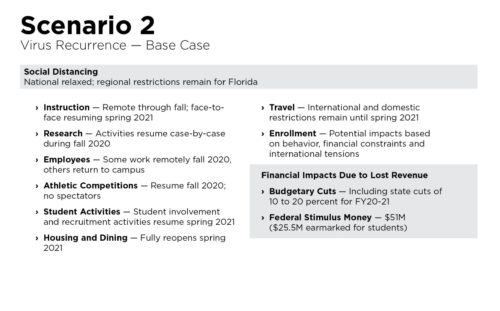
What if there’s no fall? College Ministry on an Empty Campus
How do you plan for a fall of ministry with the looming possibility of no college students on campus?
Let’s talk about:
- What we know right now
- What we can do about it
What we Know Right Now
One thing is for certain, a LOT is going to change over the summer in the world of Higher Ed. Here’s what we know right now in late April 2020:
- There’s a good chance the fall will be online
- Cal State Fullerton has already declared that their fall classes will all be online:
- “Our plan is to enter [the fall] virtually…Of course that could change depending on the situation, depending on what happens with COVID-19. But at this point that’s what we’re thinking.”
- On the flip side – Purdue University, on Tuesday, April 21, said they intend to bring students back to campus in August”. And University of Oklahoma declared on April 24: “after careful deliberation, our intention is to return to in-person educational operations by this fall”
- West Virginia is looking at three options for the fall:
- “on-campus instruction with social distancing measures in place;
- delayed arrival on campus with partial online instruction; or
- online instruction for the fall semester.”
- UCF released the scenarios they’re preparing for. The worst case – no students on campus until Fall 2021.
- Cal State Fullerton has already declared that their fall classes will all be online:
- Many universities are facing catastrophic financial losses, some will not survive.
- The Chronicle of Higher Ed reports that the University of Wisconsin estimated “it will lose $170 million in the spring semester alone from refunding room, dining, and parking fees to students…The pandemic has put unprecedented stress on colleges and their leaders.” The University of Michigan anticipates losses of up to one billion dollars.
- If you work with the admin at your university, this is a great time to show care and compassion.
- The fall on campus could be interrupted at any moment.
- “Even if the virus does appear to be contained enough for a regular move-in day in August, a new outbreak in October or November could dictate a repeat of the scrambles of March.” – Chronicle of Higher Ed (Singapore is a notable example right now of a country that had Covid under control and is now experiencing a second, worse outbreak.)
- There will likely be smaller Freshman Classes
- “20-25% of high-school seniors tell pollsters they are likely to defer admission for a year or go to school part-time (source)”
- Study abroad will likely be cancelled (Fulbright cancelled already)
- We will have dramatically less International Students
- UCF’s best case scenario (above) has zero new international students – from my understanding any international students already in the U.S. can attend. But even in best case scenario there will be hardly any international students on campus in the fall.
What we can do about it
- Delay planning for the fall. We typically plan for the fall in early May before staff leave for summer assignments. This year we’ve pencilled planing in for June 8-10. Our university chancellor said they’d likely announce their fall plans in early June. No use making a ton of detailed plans in May if they’re going to be irrelevant.
- Start making contingency plans for no students on campus in the fall.
- Carey Nieuwhof has great insight on leading during a pandemic:
- “In non-crisis conditions, your methods may have a 6 month to 5-year shelf life. In a crisis, your methods can expire in minutes or days.
- The model is temporary, but the mission is eternal. The mission is sharing the Gospel, the method was in-person gatherings.
- The agile leader doesn’t have all the answers. He or she is simply committed to continually asking questions. Agile leaders are willing to continually sacrifice methods to advance the mission.”
- Unless you’re at Cal State Fullerton, I don’t think it’s worth making real specific plans. But it’s worth putting down some initial sketches:
- How will you meet freshmen?
- If things open for a month or two, can you bring your leaders together for an on-site retreat/conference/short summer mission?
- What will we do if campus opens up then has to shut again in October because of a new outbreak?
- Practical suggestion- make sure any deposits for Fall Retreat, meeting spaces, Winter Conference are refundable.
- Even if students ARE on campus, what if we can’t have meetings > 10 people?
- Andy Crouch is recommending pastors ask “how we will accomplish our mission if no gatherings of >100 are allowed for at least a year.” This would rule out most Fall Retreats and all Winter Conferences.
- Even if we can have large meetings, should we?
- This is a question we will need to ask for the next 2 years. The perception from the community/public could be “that large Christian gatherings are putting public health at risk.” We might need to be prepared to
- only have small groups or
- be ready for the massively bad PR
- Religious events composed a good number of the “superspreading events” (SSEs) scientists are tracking. “When do COVID-19 SSEs happen? Based on the list I’ve assembled, the short answer is: Wherever and whenever people are up in each other’s faces, laughing, shouting, cheering, sobbing, singing, greeting, and praying…[They all] involved the same type of behaviour: extended, close-range, face-to-face conversation—typically in crowded, socially animated spaces.” That sounds a bit like college ministry.
- This is a question we will need to ask for the next 2 years. The perception from the community/public could be “that large Christian gatherings are putting public health at risk.” We might need to be prepared to
- The Aspen Group has a free pdf for churches of additional questions to think through post-quarantine ministry that might be helpful for staff planning. A couple of them:
- What new ways of doing ministry that we adopted during the pandemic should carry over into the future of our church?
- How will social distancing practices change the way people gather and interact within our building [weekly meeting]?
- Carey Nieuwhof has great insight on leading during a pandemic:
- Stay Informed – a few resources to stay informed (so you can make educated decisions):
- The Chronicle of Higher Ed has a constantly updating site: Live Updates: Latest News on Coronavirus and Higher Education
- Follow Jeff Selingo and Lindsay Ellis on Twitter – daily updates from experts on coronavirus related decisions in Higher Ed.
- Follow Andy Crouch on Twitter – he’s consistently been the most wise Christian voice re leading in the pandemic
- Subscribe to the Chronicle of Higher Education – this is what college presidents and Deans are reading every morning as they make policy decisions. In this time of uncertainty, it’s probably worth the $119 annual subscription.
- Trust God
- This global pandemic reminds us that we don’t control much. The primary way we express our trust in God is prayer. We can make contingency plans, stay up to date, and pray.
- “Oh, the depth of the riches and wisdom and knowledge of God! How unsearchable are his judgments and how inscrutable his ways!” (Rom. 11:33)
- Paul says that as worship. And we can too.
- I love this from John Piper in his (free!) book Coronavirus and Christ:
- “We may think the coronavirus outbreak is a setback for world missions. I doubt it. God’s ways often include apparent setbacks that result in great advances.
- Even pandemics will serve to complete the Great Commission.”
What is your team doing re planning for contingencies?
Originally published on TimCasteel.com
Tim has been on staff with





